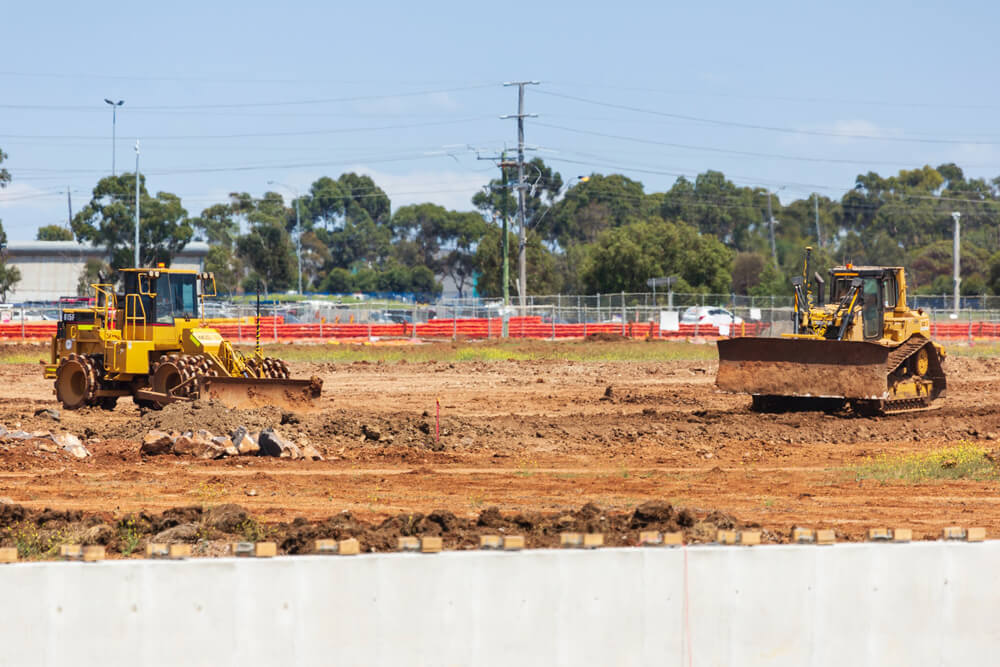Shed a Little Laser Light – A Brief History of Laser Grading

The use of lasers in construction work goes back to the 1970s when the concept of a laser level was first introduced. It wasn’t until a decade later that the patents for the line level and the spinning-mirror design laser plane were granted.
Many of the laser levels used in construction today are very close to the original patents made in the 1980s and 1990s. One of the most popular types of laser levels uses a tripod. It can self-level if the equipment is slightly moved.
A laser level projects a light beam on a horizontal or vertical axis. It helps workers maintain the outlines of the project according to plan, from the excavation phase to the construction itself.
Laser grading is widely used within the construction and building industry as it makes levelling less time-consuming and more accurate.
The Lazy Man’s Level
One of the advantages of using a laser level is that it doesn’t require more than one assistant to operate. In that way, it reduces the costs of hiring construction workers.
Laser levelling also saves a lot of time. It will automatically adjust without needing any manual help. It quickly calculates measurements to re-calibrate itself for a precise reading every time.
Another advantage to using a laser level is reliable reading accuracy. The technology it uses relies on electronic computer software and the simple principle of travelling light. In this way, laser levelling has an extremely low rate of error when the operator uses it properly
The speed of laser levelling measurements is also incomparable, with instant results. This is vital during complex construction operations.
Light Up Your Levelling; When To Use Laser Grading
Here are the main types of construction laser levels and when to use them.
Line laser levels
Line laser levels are often used with a tripod, whether they have a self-level function or not. Homeowners commonly choose this type of laser for smaller, indoor projects that only require a basic level.
A line laser level projects a vertical or horizontal line on an object and can be used as a measuring tool and reference in small construction work.
Rotary laser levels
Rotary laser levels are fit for indoor and outdoor construction work. They can be levelled manually or have a self-levelling feature, depending on the model. Rotary lasers spin the laser beam so that it creates a vertical or horizontal plane. They are used primarily in outdoor construction work, where line lasers’ functions are not in-depth enough.
Laser detectors
When working with laser levels outdoors, a laser detector is needed. It is because the human eye cannot detect laser light too well in daylight. Also, a laser detector can determine the laser position more accurately and from a greater distance.
Use a laser level for projects that require accuracy when determining the perfectly vertical or horizontal planes. For anything more than simple home projects, hiring professional contractors like TFR Construction would be your best bet. TFR Construction regularly works with lasers for laser grading, measurements, excavations, and much more, so you can rest assured that your project is in good hands.
Recent Posts
A Parcel for the Picking – Things to Consider When Buying Land for Your Home
Selecting the proper parcel of land might be challenging but approaching the task with the correct knowledge makes it worthwhile.
Stone Landscaping: Adding Statement Stone and Boulders to Your Landscape
Stone landscaping is low maintenance, sustainable, and extremely versatile. Here is a realistic view of the main pros and cons of stone landscaping.
5 Ways to Beautify Your Sleeper Retaining Walls
In this blog post, we examine how you can combine looks and function with the latest designs of retaining walls available today.
How Sleeper Retaining Walls Can Help with Property Water Drainage Systems
We take a closer look at why retaining walls can be a fantastic solution for redirecting water around the house and protecting your foundation.
What Is a Commercial Contractor?
Contractors who work on commercial buildings have the know-how, expertise, and certifications to handle commercial construction work. But what exactly is a commercial contractor, and do you need one for your next project? Read on to find out if a commercial contractor is right for you.
Recent Posts
A Parcel for the Picking – Things to Consider When Buying Land for Your Home
Selecting the proper parcel of land might be challenging but approaching the task with the correct knowledge makes it worthwhile.
Stone Landscaping: Adding Statement Stone and Boulders to Your Landscape
Stone landscaping is low maintenance, sustainable, and extremely versatile. Here is a realistic view of the main pros and cons of stone landscaping.
5 Ways to Beautify Your Sleeper Retaining Walls
In this blog post, we examine how you can combine looks and function with the latest designs of retaining walls available today.
How Sleeper Retaining Walls Can Help with Property Water Drainage Systems
We take a closer look at why retaining walls can be a fantastic solution for redirecting water around the house and protecting your foundation.
What Is a Commercial Contractor?
Contractors who work on commercial buildings have the know-how, expertise, and certifications to handle commercial construction work. But what exactly is a commercial contractor, and do you need one for your next project? Read on to find out if a commercial contractor is right for you.





